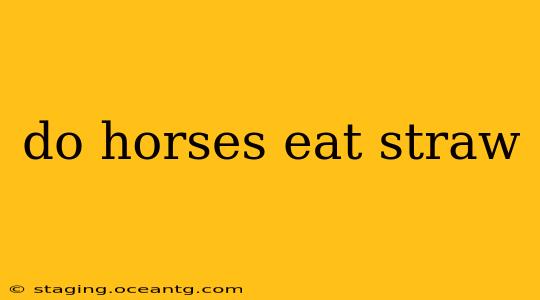Horses are majestic creatures, and understanding their dietary needs is crucial for their health and well-being. A common question among horse owners and enthusiasts is: do horses eat straw? The short answer is yes, but it's more nuanced than a simple yes or no. This article delves into the role of straw in a horse's diet, addressing common concerns and misconceptions.
What is Straw, and Why Do Horses Eat It?
Straw is the dry stalks of cereal grains left after harvesting the seeds. Common types include wheat straw, oat straw, barley straw, and rye straw. While not a primary food source, horses readily consume straw, primarily for its fiber content. Fiber is essential for digestive health, aiding in the movement of food through the gut and preventing colic. Straw provides a source of roughage, satisfying a horse's natural urge to chew and helping maintain dental health. Think of it as a "dessert" after their main meal.
Is Straw a Sufficient Food Source for Horses?
No, straw should not be the primary food source for horses. While it offers fiber, straw is relatively low in nutrients. A diet solely consisting of straw will lead to malnutrition and health problems. Horses require a balanced diet rich in protein, vitamins, and minerals, best provided through high-quality hay, pasture, and potentially commercial feed supplements depending on the individual horse's needs and workload.
What are the Benefits of Feeding Horses Straw?
- Fiber Source: Straw provides essential fiber, promoting healthy digestion and gut motility.
- Dental Health: Chewing straw helps maintain dental health by stimulating the jaw muscles and wearing down teeth.
- Reduced Boredom: Straw can be a boredom-buster for horses, especially those stabled for extended periods, providing mental stimulation through chewing.
- Cost-Effective Bedding: Straw is often used as bedding in stables, and horses may consume small amounts during their rest periods. This reduces waste as they will eat any that falls to the ground.
What are the Potential Downsides of Feeding Horses Straw?
- Nutrient Deficiency: Straw is low in nutrients and cannot provide a complete diet for horses. Over-reliance on straw can lead to weight loss, poor coat condition, and other health issues.
- Digestive Issues: While fiber is beneficial, excessive straw consumption can sometimes cause digestive upset, especially in horses prone to colic or other gastrointestinal issues.
- Type of Straw: Not all straw is created equal. Some types, like rice straw, can be harder to digest and even have a higher potential for causing impaction. Wheat straw is typically considered the safest and most palatable.
- Mold and Toxins: Straw that is improperly stored or harvested might contain mold or toxins, potentially harmful to the horse's health.
How Much Straw Should a Horse Eat?
There's no single answer to this question. The amount of straw a horse should consume depends on several factors, including the horse's age, size, activity level, overall diet, and the type of straw offered. Straw should be offered as a supplement, not a meal replacement. A small amount, offered in addition to a balanced diet of hay, should suffice for dental wear and entertainment. Always consult with your veterinarian or an equine nutritionist to determine the appropriate amount for your horse's specific needs.
What Types of Straw are Best for Horses?
Wheat straw is generally preferred due to its digestibility and palatability. Oat straw is also a suitable option. Avoid rice straw due to its potential for digestive issues. Ensure that any straw offered is clean, dry, and free from mold or toxins.
Can Horses Eat Straw All Day?
No, horses should not eat straw all day. As mentioned earlier, straw is not nutritionally complete and cannot serve as a sole food source. Feeding horses straw all day would lead to malnutrition and potentially serious health problems.
Is it better to feed straw or hay?
Hay is far superior to straw as a primary food source for horses. Hay provides essential nutrients and energy that straw lacks. Straw is a supplemental feeding option with a limited role.
By understanding the role of straw in a horse's diet, horse owners can provide their animals with a healthy and balanced nutritional plan, ensuring their well-being and longevity. Remember to always consult with a veterinarian or equine nutritionist for personalized dietary advice tailored to your horse's specific needs.
